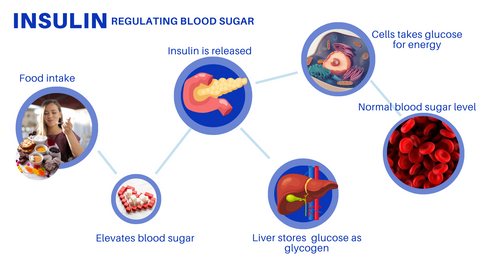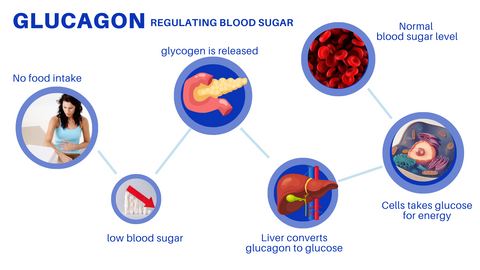The intricacies Blood Sugar Levels Management:
Blood sugar levels rise, and fall is perplexing. First, some individuals may maintain normal blood sugar levels without effort and despite unhealthy lifestyle. Whereas others may be more predisposed to elevated blood glucose levels despite living healthy. Moreover, there are facets in life as such genetics, heredity, hormonal imbalances, illnesses, or how each individual processes insulin influencing blood sugar levels fluctuations. Additionally, lifestyle choices like diet, physical activity, and state of mind also play a major role in blood sugar levels swings. Thereby making proper blood sugar levels monitoring and control vital from an early stage in life.
There two main hormones that are essential for maintaining normal glucose levels:


Insulin and glucagon help maintain blood sugar levels. While glucagon helps prevent blood sugar from dropping, insulin on the other hand stops it from rising too high.
These two essential hormones work together in a balance and play a fundamental role in regulating the individual’s blood sugar levels. Glucagon breaks down glycogen to glucose in the liver. Insulin enables blood glucose to enter cells, where they use it to produce energy.
Practical Steps for Effective Maintenance of Normal Blood Sugar Levels

Healthy Habits For Healthy Glucose Levels:
BALANCED DIET
To manage healthy blood sugar level, opt for low glycemic index foods like whole grains, legumes, and non-starchy food. Secondly, switch to diet rich in vegetables, fruits, lean proteins, and healthy fats. While limiting processed foods, sugary beverages, and refined carbohydrates.
In summary, less sugar intake less sugar to process.
EAT SLOWLY
It takes approximately 20 minutes for your brain to signal fullness, and so, chewing 21 times before swallowing gives your body the time it needs to send signals that you’ve had enough. Moreover, eating leisurely allows you to enhance your palate and savor every flavor. Consequently, it achieves the balance between satiety and nourishment.
SMALL AND FREQUENT MEALS
Establish a routine of eating before the stomach fully empties in approximately 4 hours. This ensures a steady supply of nourishment to provide your body with the energy and nutrients to function optimally. Additionally, meals and snacks consumed in appropriate portions are key to avoiding overeating and preventing blood sugar spikes.
HYDRATE
Drinking water dilutes the amount of sugar circulating in the bloodstream. That said, proper hydration provides a perfect glucose balance in the bloodstream. And so, when you become dehydrated, glucose levels can rise as the bloodstream becomes concentrated with more glucose.
Furthermore, drinking water helps the kidneys to flush out extra glucose through urine.

PHYSICAL ACTIVITY
150 minutes of moderate aerobic and strength training exercises per week.
Daily brisk walking, swimming, yoga, stretching, dancing or any enjoyable physical activity allows cells in your body to use blood sugar for energy, therefore regulating blood sugar levels in your blood streams.
Subsequently, consistent physical activities improve insulin sensitivity.

WEIGHT MANAGEMENT
Excess fat cells disrupt the balance of glucose and insulin. Additionally, fat cells release inflammatory proteins that increase insulin resistance, which leads to elevated sugar levels in the blood streams.
Therefore, following the suggested healthy habits, steps 1 to 4 in this blog help lose weight gradually.

MANAGE STRESS
Stress hormones can reduce insulin effectiveness, leading to higher blood glucose levels. Besides, it can also hinder insulin release and increase insulin resistance.
That said, find an enjoyable hobby to keep you calm and free from stress. Hobbies, like gardening, sewing, reading or deep breathing exercises like yoga.

SLEEP HYGIENE
Get 7-9 hours of quality sleep each night.
Establish a routine, same bedtime and rising same time daily. Secondly, make your bedroom conducive to sleep. A quiet, dark, comfortable, and no electronics bedroom.
Sufficient sleep promotes stable blood sugar levels and insulin sensitivity.
Take trustworthy supplements to help manage glucose levels:

Bricker Labs, Big-V Triple Strength. Premium supplement supporting maintenance of Normal Blood Sugar Management.
Bricker Labs, Big-V Triple Strength aim to harness the potential synergistic effects of relevant and highly potent minerals in promoting and maintaining healthy blood sugar levels.
This premium mineral complex is a blend of triple strength vanadyl sulfate, chromium, taurine, selenium, and niacin. Together, they may work in harmony to support insulin sensitivity, glucose metabolism, and overall blood sugar control.
Research suggests that VANADYL SULFATE may assist in improving blood sugar control by mimicking the action of insulin. Furthermore, it may enhance insulin sensitivity and facilitate the movement of glucose from the bloodstream into cells, promoting better blood sugar regulation.
CHROMIUM is an essential trace mineral that plays a role in carbohydrate and lipid metabolism. Moreover, it has been suggested to improve insulin action and enhance glucose uptake by cells, which can aid in blood sugar control.
TAURINE is an amino acid with various health benefits. Studies have indicated that it may enhance glucose tolerance and insulin sensitivity, potentially contributing to better blood sugar management.
SELENIUM is a mineral that acts as an antioxidant and has been linked to improved insulin sensitivity. Adequate selenium levels in the body may support overall metabolic health, including blood sugar control.
NIACIN, also known as vitamin B3, is involved in energy metabolism and may have a positive impact on blood sugar regulation. Additionally, it has been studied for its potential to improve insulin sensitivity and reduce markers of diabetes risk.
IN SUMMARY: Maintaining healthy blood sugar levels involves addressing genetic and lifestyle factors affecting insulin effectiveness, inhibition of insulin release, and resistance. These are factors contributing to imbalances in blood glucose levels and persistent high sugar levels. Managing blood sugar effectively requires adopting a healthy lifestyle, including stress management, regular physical activity, balanced diet, eating habits and routine, hydration, weight management, quality sleep, nutritional supplementation, and regular medical check-ups. By addressing these aspects in the early stage of life, individuals may reap the benefits of healthy blood sugar levels to support overall well-being present and future.
Disclaimer: This blog post is for informational purposes only and should not replace professional medical advice. Always consult with a qualified healthcare provider before making any changes to your supplement or daily health regimen.
Let us know your thoughts!
Feel free to comment or email us: Customerservice@brickerlabs.com

